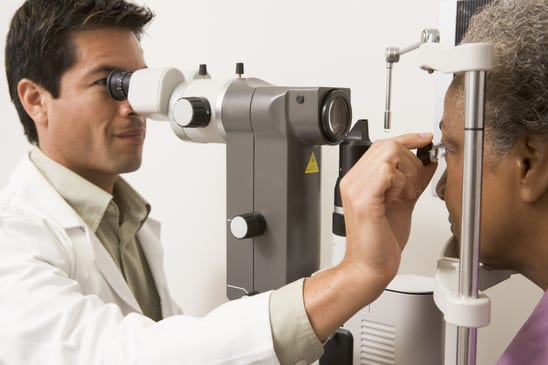We all know the basics of an eye exam and a prescription that is issued by an optometrist. But there is more to your eye doctor than just a new pair of eyeglasses or contact lenses. During a routine check-up, your optometrist is checking for much more than blurry vision. There are dozens of eye health issues that present very few if any noticeable symptoms and the only way to be certain is to schedule regular eye exams. Consult our list below for just a few complications your doctor will be checking for during your exam.
AMBLYOPIA
If the eye is physically off-centre or vary greatly in prescription, the brain can stop taking information in from the weaker eye. Untreated, this can lead to major vision development problems. Treatment can include patching the stronger eye until the weaker catches up.
STRABISMUS
Commonly causes issues with depth perception and can lead to amblyopia without regular eye exams and treatment. Identified when a doctor tests your eyes’ alignment and how efficient they work together. Commonly referred to as crossed eyes.
DISEASE
During your eye exam, your optometrist can actually look inside of your eye. This kind of monitoring is important in the detection of many eye diseases. Diseases such as glaucoma and diabetic retinopathy show very few symptoms in early phases, regular eye exams are the only way to reduce the risk of disease and vision loss. Even high cholesterol and high blood pressure can be observed during regular eye check-ups.
OTHER PROBLEMS
Among other issues, your eyes can also have difficulty focusing or working together. From young to old, only regular eye exams can reduce or treat vision problems like these. Consult with your doctor if you have any questions about your eye health; as well, notify your optometrist any time you experience difficulties or discomfort in your eyes.
Remember: a vision screening is not the same as an eye exam. A registered optometrist is the only person who can perform a comprehensive examination; anything less and you are not getting a total assessment of your eye health.
Call us at the Vision Gallery and make your eye appointment now. Be sure to consult with your optometrist to arrange an appropriate eye exam schedule. Most patients only require one yearly exam, but some may require more regular visits if they are at risk of developing or have developed any vision health issue. Our professionals and doctors will work with you to maintain your eyes and vision.

